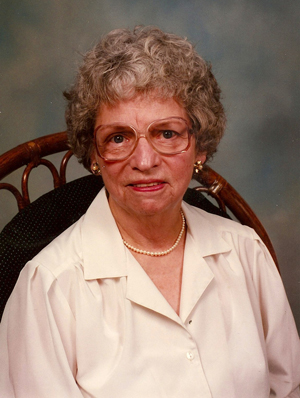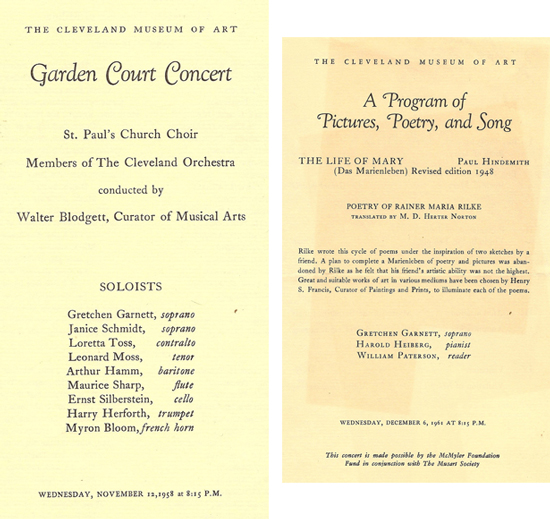by Beverly Simmons & Ross W. Duffin — Special to ClevelandClassical
Gretchen Garnett died one day short of her hundredth birthday last month. When we arrived at Case Western Reserve in 1978, she was the longest-serving faculty member in the Music Department. She had been “grandfathered in” as an applied teacher of voice after the Joint Music Program was established between Case Western Reserve and the Cleveland Institute of Music in 1968, when CIM was given responsibility for all the applied music.
She continued to teach voice students with great success until her retirement around 1990. An extraordinary person and a joy to be around, she would hum happily as she walked, smile at everyone, and speak plainly and directly. Her wit was in evidence at the lunch we shared just before her 99th birthday and, when her 100th birthday party had to be postponed for other reasons, she suggested a date next March. So we were all shocked that she didn’t make it even to December 16 – the birthday she shared with Beethoven.
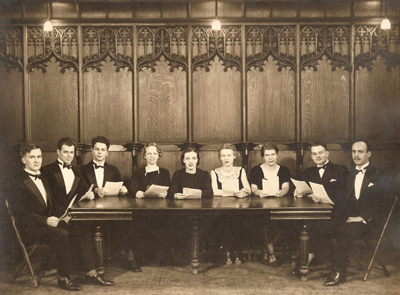
A chamber choir at Case in the late 1930s. L-R: Alfred Wright, Bill Newman, Maurice Goldman, Gretchen Nobis (Garnett), Ruth Hyde, Betty Pergande, Carolyn Gillette, Donald Dame, James Aliferes.
What people should know about Gretchen Garnett is that she was a pioneer performer, and a teacher of extraordinary gifts. As an undergraduate, she sang the role of Belinda in a performance of Purcell’s Dido & Aeneas on the stage at Severance Hall just a few months after it opened. In the cast with her were Janis Dreman (later a famous actress a.k.a. Janis Carter), and Maurice Goldman (later a famous conductor and Hollywood composer). That same year, Gretchen sang Clorinda in a production of Monteverdi’s Tancredi e Clorinda in what is now Reinberger Chamber Hall at Severance.
Early in 1934, she was on the Severance main stage again, singing Euridice in Gluck’s Orfeo. And that fall, they presented Milton’s Comus there, 300 years after its first performance (Western Reserve English Professor John Diekhoff was the world’s leading expert on that masque). Who knew that they were performing the likes of Purcell and Monteverdi at Severance Hall from the beginning? And those productions were organized by the Western Reserve Music Department – an interesting foreshadowing of our eventual specialization in historical performance.
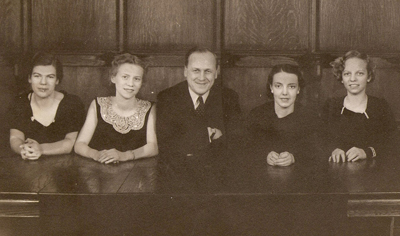
L-R: Carolyn Gillette, Betty Pergande, Jacob Evanson (director, University Singers), Ruth Hyde, Gretchen Nobis (Garnett), 1936.
From precocious undergraduate, Gretchen eventually became a voice teacher and faculty member at Western Reserve, where she taught some outstanding students. One early student was Russell Oberlin, a high school kid from Akron who came up to study with someone who was not put off by his interest in singing as a countertenor. At the time, not many voice teachers recognized countertenor singing as a legitimate vocal activity; such attitudes prevailed for decades at many conservatories. Russell went on to become a founding member of the legendary New York Pro Musica Antiqua, and was featured on all of their pioneering early music recordings.
Now retired from teaching voice at Hunter College, he remembers: “Gretchen Garnett was my first and only voice teacher until I entered The Juilliard School in 1948. She was a great inspiration to me, not only for her valuable vocal instruction, but by helping to develop in me a profound appreciation of the glories of singing, for which I remain eternally grateful. If I were asked to give one word that most described the essence of her teaching and influence on me, it would be ‘taste,’ a quality, along with great intelligence, that she had in abundance.”
Another countertenor who went on to a prominent career was Grammy Award winner Joe Jennings, whom Gretchen taught when he was an undergraduate at CWRU. He joined the recently formed male a cappella ensemble Chanticleer in 1983, then spent 26 years with them, most as music director and maker of arrangements. Joe retired from Chanticleer in 2009, and remembers: “Gretchen was a tremendous influence and inspiration and a great teacher and an incredible educator. She made a profound impression upon me and was instrumental in shaping me as a musician. I “owe” her in so many ways.”
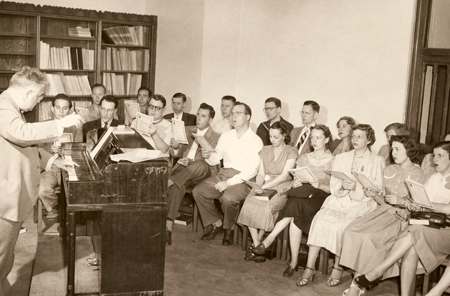
Choir of St. Paul’s Episcopal Church, Cleveland Hts., with Walter Blodgett. Gretchen Garnett is in the front row, third from right.
Kirsten Fleischmann, a fabulous mezzo-soprano, studied voice with Gretchen and music history with us, while pursuing pre-med as a music major at CWRU in the mid-80s. While she was in Gretchen’s studio, Kirsten won the National Association of Teachers of Singing competition for Ohio. After college, she went to medical school at Washington University, did a residency at Harvard, and medical research training in Germany. Now a cardiologist in San Francisco, she continues to sing oratorio solos.
“What I remember most about Mrs. Garnett,” she writes, “was her enormously positive attitude and seemingly boundless energy. She was a consummate voice teacher, but her lessons went well beyond singing and music. With a no nonsense approach and an infectious laugh, she taught her students how to take on life with both grit and grace.”
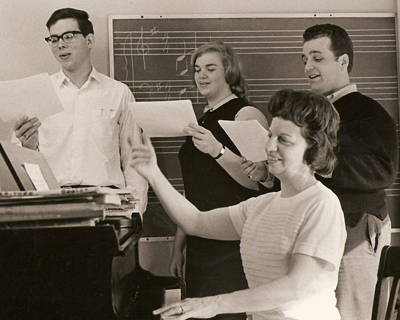
Gretchen Garnett teaching students Sandra Brown, Leonard Owens and Tom Strong in her studio on Bellflower Road in the former Blossom family house (now razed), ca. 1968.
Gretchen’s last student at CWRU was soprano Christine Brandes. Julianne Baird was coming in from the east coast to coach her in historical performance, but Gretchen was her teacher locally. Originally from Canton, Chris has become a huge “crossover” star, singing early music with well-known ensembles, but also opera and oratorio with major orchestras world-wide. Christine writes: “I was enormously grateful for Gretchen’s patience and kind support. Her ease and grace remain in my memory.”
With Gretchen Garnett’s passing, the world has lost a pioneer early voice practitioner and teacher, Cleveland has lost a superb musician and personality, and we have lost a dear friend.
Photographs courtesy of William Garnett, Gretchen Garnett’s son.
Below, programs from two of Gretchen Garnett’s recitals at the Cleveland Museum of Art in 1958 and 1961.
Published on ClevelandClassical.com January 22, 2014
Click here for a printable version of this article.




